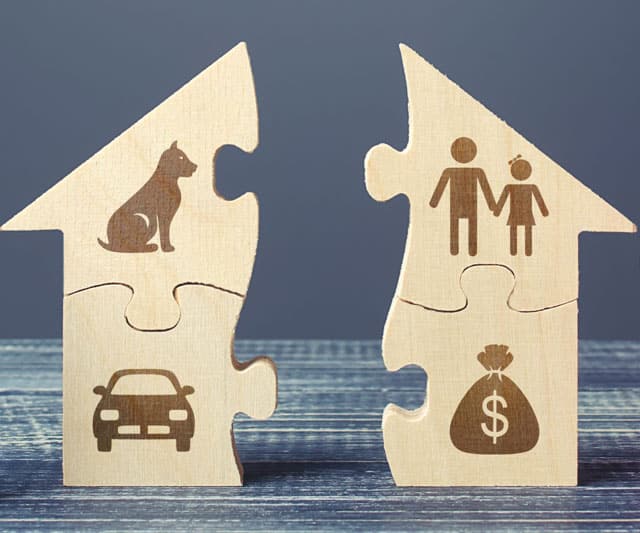During a divorce, the emotional minefield of real estate presents challenges that go far beyond the equitable division of assets, say advisors who specialize in this fraught area.
“The family home, in particular, is not just a financial asset but also one of highly emotional significance after a long marriage, kids and possibly grandchildren enjoying the ‘family compound,’” notes Michelle Smith, founder of Smith Financial Services Group (SmithFSG) in New York and a high net worth divorce financial specialist.
“Deciding whether to sell the home and divide the proceeds, or whether one party should retain the property and buy out the other’s share, involves both financial analysis and emotional considerations,” says Smith, who is a member of the Institute for Divorce Financial Analysts, a divorce mediator and a holder of the Certified Divorce Financial Analyst credential.
Smith and other advisors provided written responses and follow-up commentary to a survey on divorce and real estate by Dynasty Financial Partners.
Emotions Often Cloud Judgment
Emotional attachment to a family home and a desire to maintain it for the sake of the children can lead to potentially disastrous decisions, including the couple sharing the home, Smith and others warn. And emotions can also tug on the judgment of those no longer actively parenting.
“When a couple going through divorce are empty-nesters … still living in a large family home in which they raised their children, the couple ends up with too much house on their hands,” says Adriana Stasiuk, partner and investment advisor with Aaron Wealth Advisors in Chicago. “The costs to maintain and reside in the home no longer make sense, making a property sale and cash division more suitable.”
But the couple is not only selling their home, Stasiuk said. They’re also “selling” the community of neighbors and friends they spent years developing while raising the children. “This can make leaving and selling a more difficult decision,” she says.
Concerns for Kids Dominate Mothers’ Decisions
Mothers who are currently raising their children are most vulnerable to making bad decisions regarding real estate during a divorce, says Daniela Pedley, a partner and advisor with Summit Trail Advisors in San Francisco.
“The mother, more than the father, seems to be concerned about the stability of the child,” she tells Rethinking65. “They’re willing to give up assets to do that. For some mothers who have been looking after the children, and that’s been their primary job, especially so.”
Additional Reading: Four Ways to Help Mothers Take Charge of Their Finances
The result is that in some divorces she has dealt with, the wife chooses to hold onto the home when selling and downsizing would be wiser. Her clients’ wealth typically is $25 million and above.
She recalls a client who held onto the house for several years after a divorce for the sake of her daughter, who was attending a top school. “While the house was a good 20% of the assets to be divided and had a very expensive annual cost of $400K, she felt her daughter needed some stability over the next few years,” says Pedley who, along with the client’s divorce attorney, urged the woman to sell.
“You can’t actually afford to keep the house because you need a certain lifestyle, and in order to afford that lifestyle, you can’t have the house as well as that lifestyle,” she recalls telling the woman. “Unfortunately, when she did sell, the top of the market had softened and so she got less than the value in the marital settlement agreement.”
Keeping the family home, while understandable, is often unnecessary, says Pedley.
“Children are more resilient than many mothers think they are. So long as you are providing the love that they need, which mothers typically are, that’s enough,” she says, and the home is just a property.
“I would say it becomes far more emotional for a mother and I get that,” she adds. “I totally get that. I probably would do the same honestly,” she admits.
Perils of Home Sharing
Another area advisors say can be fraught with risk for divorcing parents is home sharing — alternately residing in the family home for the sake of the children.
Pedley cites a case that ended disastrously for one of her clients. “It lasted a short amount of time, as it didn’t work well. The father just walks in unannounced and has no boundaries — very difficult for the wife, especially in an acrimonious divorce,” she says.
“I’m not saying this wouldn’t work in a more functional household,” adds Pedley. “In this household, the husband was just really unhinged.”
Smith says a splitting couple could rent a temporary residence to use while one is staying at the family home, a practice known as “nesting.”
“It’s very difficult. But if both people can have a sense of maturity and there are ground rules, such as no girlfriend or boyfriend allowed in either house, it can be a good solution while solving for the overall asset split and economics,” says Smith.
She emphasizes that the key to making such an arrangement work is a written agreement. “One of the most important things about this sharing the residence in the short term is it must be papered, and there must be very specific ground rules not subject to either party’s selective interpretation,” she warns. Otherwise, “this arrangement can go south during Week 1.”
Analyze Before Sharing the Home
Co-owning a home after divorce can be financially advantageous, but an informed decision requires rigorous analysis, Smith says. That can include an analysis of expenses for the past 12 to 24 months as well as an estimate of maintenance and repairs that may be needed. How costs are shared will depend on how much time each parent spends in the home and who earns the income and how much.
She offered a hypothetical temporary co-owning financial arrangement for a divorcing couple: “After analysis, cost of home is $5k per month. Take $60,000 from bank or liquid non-retirement accounts and agree on the use of this amount just for the upkeep of this temporary arrangement and agree it will be without prejudice to either party,” she said, noting that it’s preferable to have a stipulation drawn up detailing this arrangement.
“Things that don’t get properly papered during a divorce can haunt one or both parties later,” Smith cautions. She also advises against living together in the same house.
“Sharing physical occupancy together during a divorce can make things more difficult on all involved,” she says. “A solution could be a short-term rental where each spouse goes when they are not with the kids in the primary residence.”
Mortgage Complications
Aside from emotional considerations, recent high mortgage rates have complicated the distribution of real estate during divorces — even when the house is not being sold, the advisors note.
“Not only does the couple have to consider the market value of the property as an asset, but also the costs of any associated loan or mortgage debt secured by the property,” Stasiuk says. “Many homeowners locked in low-rate mortgage rates for 30 years over the past decade, making that low-cost loan hard to let go of.”
Even if a divorced spouse decides to keep the home after asset division, the bank or debt issuer still will require the loan to be refinanced at today’s rates for the purpose of retitling the property, says Stasiuk.
Pedley said banks will not move until the assets are formally divided. “If the divorce is not final, which is happening to take longer and longer, the banks won’t approve a mortgage. They don’t want to risk giving you a mortgage if they don’t think there’s enough assets to support that mortgage. And so, earning even a small salary is often better than having larger assets with regards to a mortgage,” she says, noting that none of her wealthy female clients work.
In a four-decade career in journalism, Ed Prince has served as an editor with many of New Jersey’s leading newspapers, including the Star-Ledger, Asbury Park Press and Home News.







